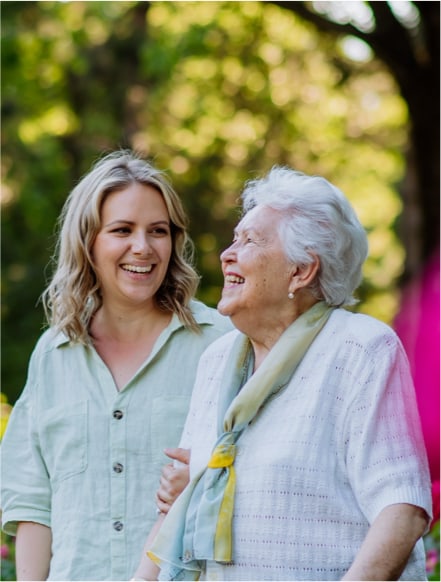Caring for a loved one can be one of the most meaningful roles you’ll take on in your life. Whether you’re helping an aging parent, a sibling with a disability, or another close relative, caregiving requires compassion, patience, and immense dedication.
But balancing work, family life, and caregiving responsibilities can easily become overwhelming. Without the right tools or support system, this incredible act of love can lead to a form of mental, emotional, and even physical exhaustion known as caregiver burnout. Some tips to help caregivers avoid burnout include:
- Prioritize self-care
- Practice mindfulness and relaxation
- Build a strong support system
- Make healthy lifestlye changes
- Plan for the long term
- Use short term respite stays
- Consider assisted living
What Is Caregiving?
Caregiving involves providing physical, emotional, and practical support to someone in need. This could mean helping with daily tasks such as cooking, cleaning, or managing medications, or offering emotional support through difficult times.
Many caregivers come into their role as adult children, family members, or close friends who want to help out of love and compassion. Others opt for professional assistance through trained caregivers, respite care services, or senior living communities. Regardless of the choices made, caregiving takes energy, dedication, and a strong support system to be able to sustain long-term.
What Is Caregiver Burnout?
Caregiver burnout is a state of physical, emotional, and mental exhaustion that stems from the constant demands of caregiving. It’s more than just regular stress. Burnout leaves you drained, unmotivated, and often unable to function at your best, both for yourself and your loved one.
Common Causes of Caregiver Burnout
Several factors contribute to burnout among caregivers, including:
- Overwhelming responsibilities: Balancing caregiving with work, family, and personal time can feel impossible.
- Lack of control: Feeling powerless to improve a loved one’s condition can lead to emotional strain.
- Unrealistic expectations: High self-imposed standards can turn caregiving into an all-consuming job.
- Disrupted routines: Major changes in daily life can increase stress and create feelings of loss.
- Loss of privacy: Having medical professionals or additional help in the home can sometimes feel intrusive.
Symptoms to Look For
Burnout can show up in many ways, so noticing the warning signs early is important. Some common symptoms include:
- Extreme exhaustion
- Irritability or frustration
- Headaches and physical aches
- Poor eating and sleeping habits
- Forgetfulness or lack of concentration
- Disinterest in social activities
- Feelings of loneliness or hopelessness
Smart Strategies to Prevent Caregiver Burnout
The good news? There are plenty of ways to avoid burnout while still being a supportive caregiver. Here’s how.
1. Prioritize Self-Care
You can’t pour from an empty cup. Taking care of yourself is the first step to being there for your loved one. Try these tips for self-care:
- Set boundaries: Know your limits and don’t hesitate to say no to additional demands.
- Take breaks: Short, regular breaks during the day can help recharge your energy.
- Find joy: Make time for hobbies you love, whether it’s painting, gardening, or meeting friends for coffee.
2. Practice Mindfulness & Relaxation
Stress builds up fast for caregivers, but relaxation techniques can be lifesavers. Incorporating mindfulness into your routine can ease feelings of tension.
- Deep breathing exercises to calm your mind.
- Try meditation for a few minutes each day.
- Join a yoga class for physical and mental balance.
3. Build a Strong Support System
You don’t have to do this alone. Surround yourself with people who can share the load or simply offer a listening ear.
- Ask family or friends for help when you need it.
- Join a support group or network of caregivers who understand your challenges.
- Seek professional counseling for emotional guidance.
4. Make Healthy Lifestyle Changes
Small lifestyle adjustments can make a big difference.
- Plan ahead by creating a manageable daily schedule with time for essential tasks and relaxation.
- Eat nutritious meals and stay hydrated to maintain your energy levels.
- Exercise regularly, even if it’s just a 15-minute walk.
- Focus on better sleep hygiene so you feel rested and recharged.

5. Plan for the Long Term
When caregiving is a long-term commitment, it’s important to have a strategy in place to avoid excessive fatigue.
- Delegate tasks to avoid taking it all on yourself.
- Create a care plan to better prepare for changes in your loved one’s needs.
- Stay on top of your health with regular checkups. You can only care for others if you’re healthy yourself.
6. Use Short-Term Respite Care
Respite care is designed to provide temporary relief to primary caregivers. Whether you need a break for a day or a month, these services ensure your loved one receives professional, compassionate care while you rest and recharge. Not only does this prevent burnout, but it also improves the quality of care your loved one receives long-term.
7. Consider Assisted Living
While it can be difficult to choose this form of care for your loved one, assisted living communities like Inspired Living at Bonita Springs can offer a comfortable, supportive environment. With amenities like tailored care plans, engaging activities, and access to medical experts, assisted living ensures your loved one’s physical and emotional well-being is cared for.
Caring for Yourself While Caring for Others
Being a caregiver is no easy task, but showing kindness and care to yourself is just as important as what you give to your loved one. Implementing small changes like the ones we’ve discussed can make caregiving more manageable and fulfilling. Don’t hesitate to seek help when needed or take well-deserved breaks.
At Inspired Living at Bonita Springs, we’re always here to support you on this caregiving journey. If you’re exploring options like respite care or memory care, give us a call today or schedule a tour. Together, we can find the best solution for you and your loved one.









